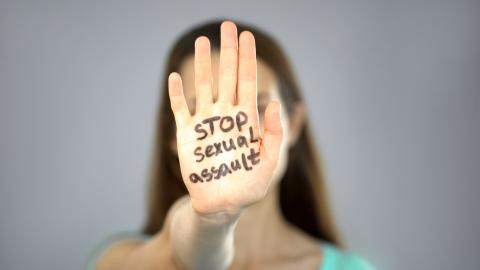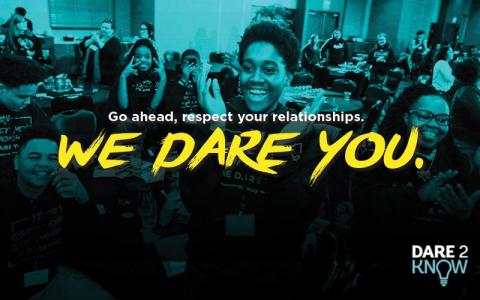Sexual Violence Prevention
Sexual violence happens in every community. Victims are never to blame.
Sexual violence impacts everyone, but disproportionately affects people in marginalized communities.
In Wisconsin:
- Nearly one in five high school students (19.9%) reported that someone has forced them "to do sexual things they did not want to do." (Youth Risk Behavior Survey)
- 43.4% of LGBT students have experienced sexual assault or coercion. (Youth Risk Behavior Survey)
Nationally:
- One in three women and one in six men have experienced sexual violence in their lifetime. (National Intimate Partner and Sexual Violence Survey)
- 90% of victims know the person who assaulted them. (Rape, Abuse and Incest National Network)
What you can do
- Support victims and survivors
- Know and practice consent
- Be an active bystander
- Help shift harmful norms
- Be aware of the language you use
- Build connections and support organizations and events in your community that are working to end sexual violence
Looking for support?
You can find information on the Wisconsin Coalition Against Sexual Assault (WCASA) website to connect with a service provider near you.
Sexual violence is a verbal and/or physical act that breaks a person's trust and safety and is sexual in nature. Behaviors range from sexual harassment to unwanted fondling to forced penetration. All are done without consent.
Sexual assault is defined in Wis. Stat. § 940.225 sexual assault; Wis. Stat. § 940.32 stalking; Wis. Stat. § 948.02–948.11 sexual assault of a child; Wis. Stat. § 940.302 human trafficking.
We have partnered with End Domestic Abuse Wisconsin to promote the Dare2Know Campaign. This campaign aims to promote healthy relationships and end teen dating violence. Learn more about the Dare2Know Campaign and get the facts about dating violence.
- Wisconsin Sexual Violence Prevention Program, Summary Report 2019-2024 (PDF). This report describes strategies and core activities carried out by five funded grantee sites. It provides an overview of site strategies and partnerships, supports provided by state partners, reach of program activities, key successes, challenges, and lessons learned across the sites.
- Sexual Violence Prevention Program Action Plan 2024-2029, P-03577 (PDF). This action plan was informed by many key partners and outlines the focus for the next five years of the Sexual Violence Prevention Program, funded by the Rape Prevention and Education Grant.
- 2021 Sexual Violence Prevention Survey Summary, P-03096 (PDF)
Sexual Violence Prevention Needs Assessment Report 2018-2019, P-02445 (PDF) - Sexual Violence in Wisconsin, P-02763 (PDF)
- Not Safe at Home? Statewide Resources for Interpersonal Violence, P-02772 (multiple languages)
Sexual violence prevention infographics
Together, we can build safe online spaces
Check out these prevention resources from the National Sexual Violence Resource Center (NSVRC) on preventing online harassment and abuse, keeping kids safe online, and digital consent and boundaries.
Education and prevention programs
- Wisconsin Department of Health Services Sexual Violence Prevention Program and Adolescent Health Program
- Wisconsin Department of Public Instruction Information for schools on how to reduce and respond to sexual violence.
- Did you know that 1 in 5 teens experience dating violence in Wisconsin? Learn more at Dare2Know Wisconsin.
Program services for survivors
- Wisconsin Coalition Against Sexual Assault (WCASA)’s list of providers and available services for survivors of sexual violence.
- Wisconsin Department of Justice, Office of Crime Victim Services.
Peer-support program for LGBTQ+ youth
Mental Health America of Wisconsin's PRISM Program connects LGBTQ+ youth with trained peer-specialists to provide free emotional and mental health support and mentorship.
Online and toll-free warmline: 414-336-7974
Additional data sources
- National Intimate Partner and Sexual Violence Survey (NISVS)
- National Intimate Partner and Sexual Violence Survey (NISVS), Sexual Orientation Report (PDF)
- U.S. Transgender Survey
(Note: Data from a large, non-randomized sample of the transgender community) - Wisconsin Department of Justice, Bureau of Justice Information and Analysis, Uniform Crime Reporting data dashboards (Note: the data displayed on these dashboards may not match the fact sheet, as the dashboard and fact sheet use different methodology. Please review notes on the dashboards for more information.)
- Wisconsin Youth Risk Behavior Survey (YRBS) Report, 2019 (PDF)
Contact us and stay in touch
Subscribe to our mailing list to stay informed on the latest news and opportunities.
Email us at dhsadhealth@dhs.wisconsin.gov.
Division of Public Health
PO Box 2659
Madison, WI 53701-2659


